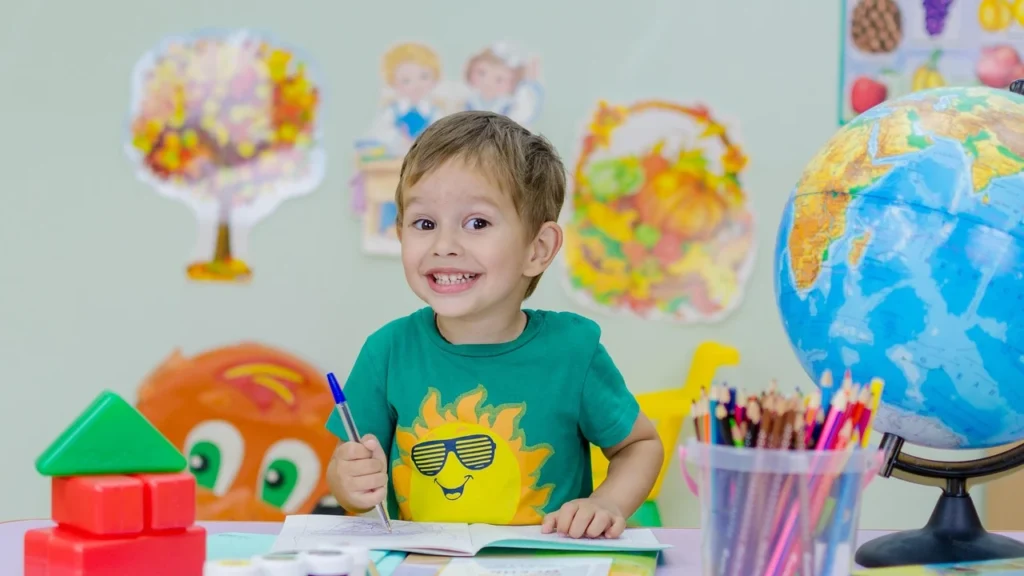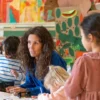![A Nurturing Start: How Mt. Juliet Day School Prepares Young Minds for Lifelong Success The Importance of Early Childhood Education Early childhood education is not merely a stepping stone to formal schooling—it is the foundation upon which a child’s cognitive, emotional, and social development […]](https://dayschools.org/mtjuliet/wp-content/uploads/sites/6/2024/09/day-school-9.webp)
Table of Contents
The Importance of Early Childhood Education
Early childhood education is not merely a stepping stone to formal schooling—it is the foundation upon which a child’s cognitive, emotional, and social development is built. The experiences children have during their formative years shape their capacity for learning, influence their approach to problem-solving, and lay the groundwork for lifelong intellectual curiosity. During this period, young minds are highly receptive, rapidly forming neural connections that define their ability to process information, think critically, and interact with the world around them.
Studies consistently affirm that children who receive high-quality early education demonstrate superior academic performance, enhanced emotional intelligence, and greater long-term success. Beyond academics, early childhood education fosters adaptability, resilience, and a sense of curiosity—qualities that are indispensable in an ever-changing global landscape.
At Mt. Juliet Day School, early education is more than a curriculum; it is a carefully designed journey of exploration, discovery, and growth. The school’s approach integrates structured learning with experiential activities, ensuring that children develop foundational skills while retaining a natural enthusiasm for discovery. Through guided play, interactive storytelling, and collaborative problem-solving, students cultivate a love for learning that extends far beyond the classroom.
The importance of early education also extends to social and emotional development. Mt. Juliet Day School places a strong emphasis on nurturing emotional intelligence, helping children understand their feelings, express themselves effectively, and build meaningful relationships. These interpersonal skills, cultivated in a supportive environment, enable students to navigate both academic challenges and real-world interactions with confidence and empathy.
By investing in early education, Mt. Juliet Day School ensures that students are not only prepared for elementary school but are also equipped with the critical thinking abilities, emotional resilience, and curiosity needed for lifelong success. It is not just about preparing children for the next grade—it is about preparing them for life.
A Curriculum That Cultivates Cognitive Growth
Cognitive development in early childhood is a dynamic process that requires both structure and flexibility. At Mt. Juliet Day School, the curriculum is designed to strike the perfect balance between academic rigor and experiential learning, allowing children to explore, question, and build critical thinking skills in a way that feels natural and engaging.
A core focus of the school’s curriculum is literacy, as reading and language acquisition lay the groundwork for all future learning. Students are introduced to phonics, storytelling, and vocabulary development through interactive read-aloud sessions, group discussions, and creative writing exercises. These activities strengthen comprehension and communication skills while fostering a deep appreciation for literature.
Mathematics is seamlessly woven into everyday experiences, encouraging children to recognize patterns, understand numerical relationships, and develop problem-solving abilities. Rather than relying solely on rote memorization, students engage in hands-on activities such as counting games, puzzles, and real-world math applications that enhance conceptual understanding.
Science exploration ignites curiosity and promotes logical reasoning. At Mt. Juliet Day School, children participate in hands-on experiments that introduce fundamental scientific concepts in an exciting and accessible way. Whether observing the life cycle of a butterfly, mixing colors to understand chemical reactions, or exploring physics through simple machines, students develop a sense of wonder and analytical thinking skills that serve them well beyond the classroom.
Beyond core subjects, the curriculum integrates music, art, and physical education to support holistic brain development. Creative expression through painting, sculpting, and music fosters fine motor skills, imagination, and emotional expression. Movement-based activities, from dance to organized sports, enhance coordination, balance, and overall physical well-being.
By implementing a research-backed, child-centered approach, Mt. Juliet Day School ensures that learning is not just about memorizing facts but about fostering a lifelong enthusiasm for knowledge. The curriculum adapts to each student’s unique developmental stage, allowing them to progress at a pace that builds both competence and confidence.
Through this well-rounded educational framework, children leave Mt. Juliet Day School with a solid cognitive foundation that prepares them for academic success while instilling in them the curiosity and problem-solving mindset needed to excel in an ever-changing world.

The Role of Play in Foundational Learning
Play is not a mere diversion; it is a cornerstone of cognitive, social, and physical development. At Mt. Juliet Day School, play-based learning is intentionally woven into the curriculum, providing children with rich opportunities to develop essential life skills through exploration and discovery.
Imaginative play serves as a gateway to creativity and emotional expression. Role-playing scenarios allow children to step into different perspectives, fostering empathy and a deeper understanding of social interactions. Whether they are pretending to be doctors, astronauts, or community helpers, these experiences help them process real-world situations in a safe and supportive environment. Storytelling and dramatic reenactments further enhance their ability to communicate ideas and emotions effectively.
Hands-on activities, such as building structures with blocks or solving intricate puzzles, cultivate spatial reasoning, problem-solving abilities, and logical thinking. Engaging in such tasks strengthens neural connections and lays the groundwork for mathematical and scientific comprehension. Outdoor exploration, on the other hand, encourages sensory development, motor skills, and an appreciation for the natural world. Running, climbing, and interacting with their surroundings inspire curiosity and enhance physical coordination.
Both structured and unstructured play opportunities are carefully designed to maximize learning potential. Structured activities, such as guided cooperative games, teach teamwork and strategy, while unstructured free play encourages autonomy and decision-making. By offering a balance of both, Mt. Juliet Day School ensures that children build confidence, resilience, and adaptability—qualities that will serve them well in academic and social spheres alike.
Fostering Emotional Intelligence and Social Skills
A truly enriching education extends beyond academics—it nurtures emotional intelligence and interpersonal skills that shape a child’s ability to navigate the world. At Mt. Juliet Day School, emotional development is given the same level of importance as intellectual growth, ensuring that students develop self-awareness, empathy, and effective communication skills.
Through carefully structured group activities, children learn valuable lessons in patience, cooperation, and conflict resolution. Whether working on a collaborative art project, engaging in peer discussions, or participating in team-building exercises, students are encouraged to express themselves while respecting differing perspectives. Educators provide gentle guidance, reinforcing positive social behaviors and helping children recognize the impact of their words and actions.
Storytelling and role-playing are integral tools for emotional growth. By engaging in narratives that explore themes of kindness, perseverance, and moral decision-making, children internalize key values that shape their character. Discussions following these activities allow them to articulate their thoughts, process emotions, and develop a deeper understanding of their own feelings and those of others.
A strong sense of community is cultivated within the school environment. Inclusivity, respect, and kindness are not just encouraged but embedded in the daily interactions between students and educators. By fostering a culture where children feel seen, heard, and valued, Mt. Juliet Day School helps them develop the confidence to engage with others in meaningful and constructive ways.
Mastering emotional intelligence at an early age equips children with the tools to build lasting relationships, adapt to new social settings, and face challenges with resilience. These foundational skills prepare them not only for academic success but also for a lifetime of meaningful connections and personal fulfillment.
Personalized Attention Through Small Class Sizes
Every child is a distinct individual with their own learning pace, interests, and strengths. At Mt. Juliet Day School, small class sizes are a deliberate choice—an educational philosophy that prioritizes quality over quantity. This approach ensures that each student receives the personalized attention necessary to thrive academically, socially, and emotionally.
With fewer students per classroom, educators can develop a deeper understanding of each child’s unique learning style. This enables them to tailor lesson plans, adapt instructional methods, and provide targeted support where needed. Whether a child excels in literacy but struggles with numeracy, or thrives in hands-on activities but requires guidance in social interactions, teachers can fine-tune their approach to nurture well-rounded development.
A smaller classroom setting also fosters a highly interactive learning environment. Students are encouraged to ask questions, engage in discussions, and actively participate in hands-on activities without the hesitation that can arise in larger groups. This engagement enhances comprehension and retention, transforming passive learners into confident, inquisitive individuals who take ownership of their education.
Beyond academics, the advantages of small class sizes extend to emotional well-being and social development. A close-knit classroom community allows children to build strong relationships with both their peers and teachers. Feeling seen and valued in an intimate setting fosters a sense of belonging, which in turn boosts self-esteem and motivation. When students know that their contributions matter, they develop the confidence to take intellectual risks, embrace challenges, and persist through difficulties—an essential mindset for lifelong learning.
The nurturing environment created by small class sizes at Mt. Juliet Day School is not just about individualized instruction; it is about cultivating a love for learning, fostering resilience, and empowering children to reach their full potential. Through this personalized approach, students embark on their educational journey with enthusiasm, curiosity, and a foundation that supports future academic excellence.

Highly Qualified Educators: The Architects of Early Learning
The quality of a child’s early education is directly linked to the expertise and dedication of their teachers. At Mt. Juliet Day School, educators are more than instructors—they are mentors, role models, and facilitators of curiosity. The school prioritizes hiring highly trained professionals with specialized knowledge in child development, instructional strategies, and behavioral psychology.
Every educator at Mt. Juliet Day School undergoes rigorous training to understand the intricacies of early childhood learning. They are well-versed in developmental milestones, allowing them to tailor lessons that align with each child’s cognitive, social, and emotional growth. Their expertise ensures that learning remains engaging, effective, and responsive to individual needs.
Beyond initial training, teachers are committed to continuous professional development. They stay abreast of the latest research in education, implementing innovative and evidence-based methodologies that enhance student learning. Whether incorporating play-based strategies, fostering critical thinking, or promoting emotional intelligence, educators at Mt. Juliet Day School are equipped to provide a holistic and enriching experience that prepares children for future academic success.
A Safe and Stimulating Learning Environment
Children flourish in environments where they feel secure, valued, and encouraged to explore. At Mt. Juliet Day School, great care is taken to create a learning space that is both physically safe and intellectually stimulating. Every classroom is thoughtfully designed to balance structure with flexibility, fostering independence while promoting collaboration.
Interactive learning stations feature age-appropriate materials that inspire creativity and problem-solving. Whether a child is engaging in a sensory exploration table, a hands-on science experiment, or a literacy corner filled with diverse books, the classroom environment is tailored to spark curiosity. Open layouts encourage movement and engagement, while cozy reading nooks provide a quiet space for reflection.
Safety is a top priority, with strict protocols in place to ensure that students are protected at all times. Supervised outdoor play areas allow children to develop gross motor skills while enjoying fresh air, and secure entry systems provide peace of mind to parents. Equally important is the emphasis on emotional well-being—teachers foster a culture of kindness, inclusion, and respect, ensuring that students feel comfortable expressing themselves and taking intellectual risks without fear of failure.
Parental Involvement: Strengthening the Home-School Connection
The foundation of a child’s education is strengthened when parents and educators work in tandem. At Mt. Juliet Day School, parental involvement is not just encouraged—it is an integral part of the learning experience. The school recognizes that learning does not stop at the classroom door; instead, it extends into the home, where parents play a crucial role in reinforcing concepts and fostering a love for learning.
Regular communication between teachers and parents ensures that families are well-informed about their child’s progress, strengths, and areas for growth. Through detailed progress reports, parent-teacher conferences, and digital updates, families remain actively engaged in their child’s educational journey.
Beyond communication, Mt. Juliet Day School organizes workshops, interactive family events, and educational resources designed to help parents support their child’s learning at home. From literacy nights to STEM exploration activities, these events strengthen the bond between home and school, creating a unified approach to education.
By fostering this strong home-school connection, Mt. Juliet Day School ensures that children receive consistent guidance, encouragement, and reinforcement, setting them on a path toward lifelong success. Parents become partners in education, actively contributing to their child’s academic achievements and personal growth.

Preparing Students for Seamless Transitions
The shift from preschool to elementary school marks a crucial developmental milestone in a child’s academic journey. While transitions can be overwhelming, Mt. Juliet Day School ensures that students are well-equipped with the necessary skills and mindset to approach new challenges with confidence.
A strong emphasis on independence, adaptability, and critical thinking forms the foundation of this preparation. Teachers encourage students to take initiative, solve problems creatively, and explore solutions independently, fostering a sense of ownership over their learning. Through structured routines, engaging activities, and gradual exposure to more advanced academic concepts, children develop the resilience needed to navigate new environments with ease.
Social and emotional readiness is equally prioritized. Educators guide students in managing emotions, building positive relationships, and handling change with self-assurance. Small group discussions, role-playing exercises, and collaborative projects reinforce communication and teamwork skills—essential attributes for success in any learning environment.
By cultivating curiosity and self-sufficiency, Mt. Juliet Day School transforms transitions from intimidating experiences into exciting opportunities for growth. Graduates leave with the confidence to embrace new educational challenges, ensuring a seamless and successful shift into elementary school and beyond.
The Lasting Impact of a Strong Educational Foundation
The benefits of a high-quality early education extend far beyond the classroom, shaping children into capable, inquisitive, and well-rounded individuals. At Mt. Juliet Day School, students gain more than academic knowledge; they develop the intellectual curiosity, emotional intelligence, and social competence necessary to thrive in an ever-evolving world.
A robust early education fosters a lifelong love for learning. The ability to ask questions, seek solutions, and engage with new ideas becomes second nature to students who have been nurtured in an environment that values exploration and critical thinking. These attributes empower children to excel in future academic settings, setting them apart as proactive and engaged learners.
Equally important is the cultivation of strong character and ethical values. Through daily interactions, moral discussions, and community-building activities, students develop integrity, empathy, and a sense of responsibility. These qualities not only prepare them for academic success but also equip them to navigate life’s challenges with resilience and purpose.
Mt. Juliet Day School’s approach ensures that students do not merely progress from one grade level to the next; they carry with them the confidence, adaptability, and skills to excel in every stage of life. By investing in a comprehensive and enriching early childhood education, the school lays the groundwork for a future generation of leaders, innovators, and compassionate individuals prepared to make meaningful contributions to society.






